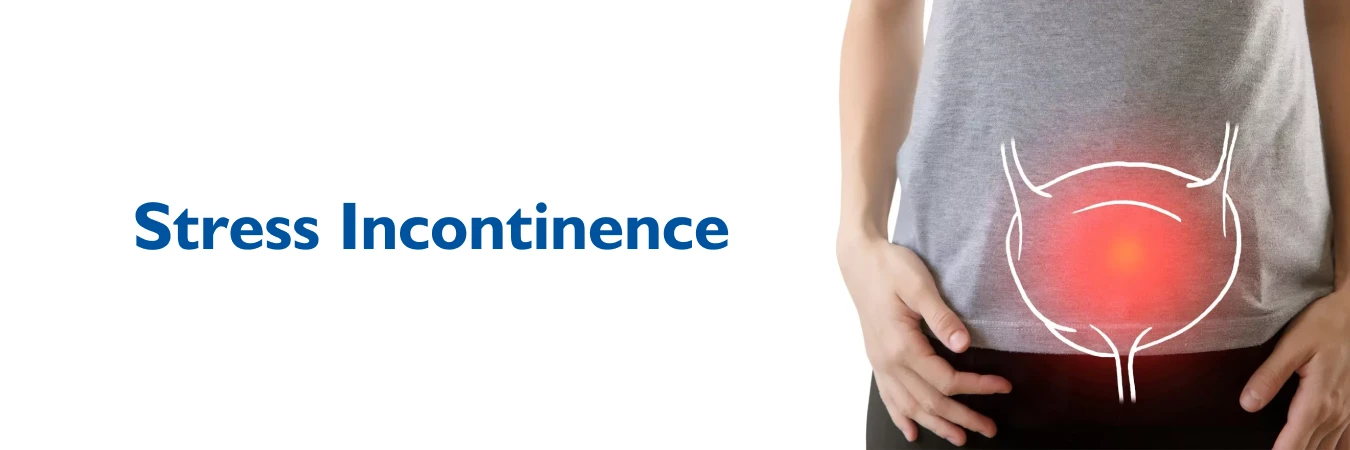- Cardiology 84
- Dermatology 45
- Endocrinology 33
- ENT 16
- Fertility 190
- Gastroenterology 78
- General-Medicine 81
- Gynecology 80
- Hematology 19
- Infectious-Diseases 33
- Neurology 52
- Oncology 34
- Ophthalmology 23
- Orthopedics 69
- Pediatrics 31
- Procedure 23
- Public-Health 144
- Pulmonology 59
- Radiology 8
- Urology 68
- Wellness 161
- Woman-and-child 77

What is Stress Incontinence?
Many people are afraid of laughing, coughing or lifting any heavy object, just because it can make them pee. Though people hesitate to talk about this condition, it happens and is recognised as a medical condition that can be treated.
Urinating 4 to 10 times a day is considered healthy and we pee to get rid of excess water and waste. However, sudden, uncontrolled urination during any activity or movement might be embarrassing, and this can be a sign of stress incontinence!
Urinary incontinence is the unintentional flow of urine, whereas stress incontinence happens when any physical activity or movement, such as
- Laughing
- Coughing
- Running
- Heavy lifting
Sneezing puts stress (pressure) on the bladder, causing urine leakage. It should be noted that stress incontinence is not related to psychological stress.
Stress Incontinence Causes
- When the muscles that control urine release and the other tissues that support the urethra weaken, then stress incontinence occurs.
- Usually, the valve-like muscles in the urethra, the short tube that transports urine out of the body, remains closed as the bladder swells, preventing urine leakage until people reach a bathroom.
- When those muscles weaken, anything that puts pressure on the pelvic and abdominal muscles, for example, sneezing, leaning over, lifting, or laughing hard might presses the bladder and cause urine leakage.
- A weak pelvic floor muscles can also be a contributing factor.
- The pelvic floor muscles may weaken because of:
- Childbirth: In women, nerve or tissue damage during childbirth can weaken the pelvic floor muscles or sphincter, causing stress incontinence after delivery or years later.
- Prostate surgery: In men, the surgical removal of the prostate gland to treat prostate cancer might weaken the sphincter and cause stress incontinence.
- Other factors that may worsen stress incontinence are chronic coughing and obesity.
Can Stress Incontinence be Cured?
- Stress incontinence can be cured with simple lifestyle changes and medical treatment. To treat incontinence, the health care provider may recommend a combination of treatments.
- If any underlying cause, such as a urinary tract infection, is found, patients will be treated for the condition as well.
Treatment
Some therapies may help to eliminate or reduce stress incontinence. The doctor may recommend the following therapies:
- Pelvic floor muscle exercises: These exercises can help to strengthen the pelvic floor muscles and urinary sphincter.
- Fluid consumption: Carbonated, caffeinated and alcoholic beverages should be avoided because they may affect bladder function in some persons.
- Bladder training: The healthcare provider might recommend a schedule for toileting if you have mixed incontinence. More frequent emptying of the bladder may reduce the severity of incontinence.
Can lifestyle changes for Stress Incontinence?
Yes, changing lifestyle can help to cure stress incontinence. Here are some healthy lifestyle practices that can ease symptoms of stress incontinence. These include:
- Losing excess weight
- Consume a healthy diet
- Limit the intake of alcohol
- Follow a fiber-rich diet plan
- Reduce caffeine intake.
Follow the stated lifestyle changes for a complete cure of stress incontinence. These tips would help to also reduce other health complications.
Urogynecologists offer specialized care to female patients of all ages who have urinary tract disorders and also provide treatment for urinary or stress incontinence in men and women of all ages.
Reference link
https://www.nejm.org/doi/full/10.1056/nejmcp0707023Ready to take control of your health journey? Book your appointment now and start your path towards wellness today!
Book an AppointmentFrequently Asked Questions
Stress incontinence is when you leak urine when you cough, sneeze, laugh, or do physical activities.
It is caused by weak muscles around the bladder and urethra.
Anyone can get it, but it's more common in women, especially after childbirth or menopause.
Yes, men can have it too, especially after prostate surgery.
The main symptom is leaking urine when doing activities like coughing, sneezing, or exercising.
A doctor will ask about your symptoms and may do tests like a urine test or bladder function test.
Treatments include pelvic floor exercises, medications, lifestyle changes, or surgery.
Yes, exercises like Kegels can strengthen the muscles and help reduce leaks.
Some medications can help, but they are not the main treatment.
Many people can improve their symptoms with treatment, but it may not be completely cured.
Losing weight, quitting smoking, and avoiding heavy lifting can help.
Yes, surgery can help in severe cases when other treatments don't work.
Regular pelvic floor exercises and maintaining a healthy weight can help prevent it.
It can get worse with age, but treatment can help manage the symptoms.
Yes, pads or liners can help manage leaks and keep you dry.

- Cardiology 2132
- Dermatology 168
- Endocrinology 135
- ENT 97
- Fertility 217
- Gastroenterology 232
- General 478
- General-Medicine 1685
- Gynecology 169
- Hematology 85
- Infectious-Diseases 208
- Neurology 207
- Oncology 345
- Ophthalmology 65
- Orthopedics 187
- Pediatrics 83
- Procedure 72
- Public-Health 209
- Pulmonology 126
- Radiology 13
- Second Opinion 311
- Urology 294
- Wellness 600
- Woman-and-child 447
Related Blogs
If you have any questions, please fill out the enquiry form or call us, and we will get back to you promptly.
040-68334455